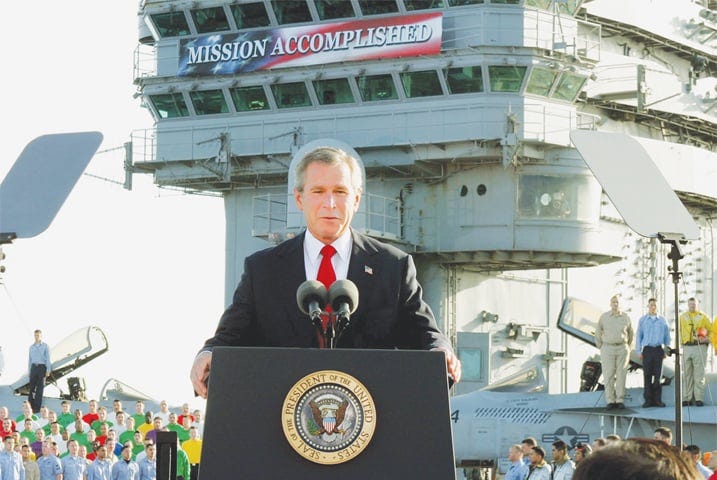Have U.S. Leaders Learned the Lessons of the Iraq War Twenty Years Later?
America's tragic failures suffered during the war in Iraq suggest there may be unforeseen consequences stemming from continued U.S. military involvement in Biden's proxy war against Russia in Ukraine
President George W. Bush Giving a Speech on the deck of the USS Abraham Lincoln Declaring the End of Major Combat Operations in Iraq
The Unlearned Lessons of the Iraq War
Next month is the one-year anniversary of the U.S. invasion of Iraq which began on March 19, 2003. Unlike most previous U.S. wars, the U.S. invasion of Iraq was an illegal, unjustifiable, and unprovoked act of aggression. I wrote a dozen articles in opposition to then President George W. Bush’s plan to invade Iraq from June 2002 to mid-March 2003. At the time, there were eight retired three-star and four-star generals who had come out in opposition to an invasion of Iraq. Most political scientists joined me in opposing the war as well but large bipartisan majorities in Congress voted to approve the authorization to invade Iraq in October 2002 and the Bush administration disinformation campaign succeeded in propagandizing over 70% of the American people to support it. Unlike the First Iraq War a dozen years earlier, the invasion had little international support with the U.K. being the only country to join the U.S. in invading Iraq. I believe history has vindicated opponents of the war like myself who warned that a US invasion of Iraq would prove to be an unmitigated disaster for US national security as it would destroy regional stability and create a vacuum in power which the Islamic Republic of Iran and its Islamist terrorist minions would be certain to fill.
The Bush administration provided multiple misleading narratives to support their invasion. Their first and most well-known justification for the invasion was that Iraq was building weapons of mass destruction including a nuclear weapons development program, which Bush himself admitted turned out to be false after an exhaustive year-long search proved Iraq had destroyed all of its weapons of mass destruction as mandated under UN Security Council Resolutions. The Bush administration asserted that Saddam was planning to give weapons of mass destruction to Al Qaeda which was obviously false given that Iraqi dictator Saddam Hussain had been fighting a war against Ansar al Islam and other Iranian backed terrorist groups for decades and that they had been fighting a war against Iranian terror on America’s behalf. Bush later admitted that Saddam had nothing to do with the Al Queda attacks against the U.S. on September 11, 2001. Even the claim that Saddam used chemical weapons to kill thousands of Iranian-backed Kurdish rebels while Saddam was still a US ally seems dubious given the fact that the dead Kurds died in a way caused by a type of chemical weapon that Iraq did not possess but Iran did. Next, the administration asserted that even if Saddam had no weapons of mass destruction, the U.S. invasion was justified because Saddam was mass murdering his own people and that the US had to invade Iraq to stop it even though Communist China and other countries were mass murdering their citizens at a far higher rate. Finally, Bush invaded Iraq in pursuit of his declared regime change policy to spread “democracy” across the world even if it had to be imposed by direct U.S. military force.
Keep reading with a 7-day free trial
Subscribe to The Real War to keep reading this post and get 7 days of free access to the full post archives.




